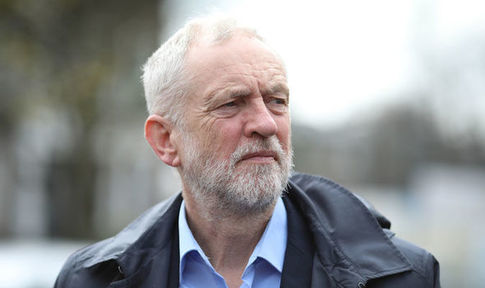Corbyn and Johnson - Anshel Pheffer in Ha'aretz:
'The Labour Party’s anti-Semitism crisis rumbled on this week, fueled as ever by a daily supply of anti-Jewish social media postings from its members, controversial quotes from its leader, Jeremy Corbyn, and his team’s refusal to engage with the Jewish community in any way but with one-sided, self-serving statements. The ongoing saga was reinvigorated by a parallel development in the ruling Conservative Party, as the former foreign secretary, Boris Johnson, cooked up his own racism scandal.
Last weekend, Johnson wrote one of his whimsical columns in The Daily Telegraph, this time choosing Denmark’s new law that forbids wearing full-face veils in public. Johnson’s bottom line was to oppose the “burka ban,” which targets Muslim women’s niqab or burka coverings. But the dismissive way he wrote that burkas make their wearers look like “letter boxes” and “bank robbers” was perceived by many as a thinly-veiled attack on Islam and on Muslims in general. The criticism has led to an official probe of Johnson by the party and demands from senior ministers that he apologize. Just as in Labour, there are many Johnson supporters who see all this as an unwarranted and politically-motivated witch-hunt, and deny there is such a thing as Islamophobia in their ranks.'
'While Johnson, unlike Corbyn, is currently a backbencher, there are many parallels between the anti-Semitism issue in Labour and what is now being seen as a similar Islamophobia crisis looming over the Conservatives. In both cases, the majority of the party’s MPs are enraged, calling for a probe and apologies. While both Corbyn and Johnson have only a small number of MPs on their side, they both enjoy a much wider, almost cult-like following among their party’s radical ideological fringe.
Another parallel between Corbyn and Johnson is that neither of them is entirely trusted by their colleagues on the main issue threatening Britain’s future: Brexit, the impending departure of the United Kingdom from the European Union. Corbyn, as leader of Labour during the Brexit referendum in 2016, officially held to the party’s position of remaining within the EU. However, his public statements on the matter failed to show any degree of enthusiasm, and he repeatedly refused to take part in cross-party Remain campaign events. As some have observed recently, Corbyn has sat on the same platforms with Holocaust deniers and conspiracy theorists, but he wouldn’t sit with Conservative Prime Minister David Cameron on the same platform against leaving the EU.'
'Throughout his career, before becoming leader, Corbyn was part of the hard-left faction that saw the EU as a capitalist cabal imposing its edicts on member nations to the detriment of workers’ rights. He has done little since becoming leader to show he has changed this position. On June 24, 2016, the morning after the Brexit referendum, he shocked many in his party by calling for the immediate signing of article 50, which would begin the process of departing from the EU. He is now opposing the demand by a large group of pro-Remain Labour MPs for holding a “second referendum” on the actual terms of Britain’s departure. This could prove an even more divisive issue for Labour than the definition of anti-Semitism.'
Read the article here.
Whether Corbyn's anti-Semitism is more than an image problem remains to be seen. His lackluster support for the remains campaign ('Corbyn has sat on the same platforms with Holocaust deniers and conspiracy theorists, but he wouldn’t sit with Conservative Prime Minister David Cameron on the same platform against leaving the EU.') is much more a liability.
Regardless of anti-Semitism, there appear to be less and less people who believe that Corbyn is the savior of the left, which is good.
Unfortunately the unsavory opinions of Boris Johnson remain rather populair inside and outside the UK.
